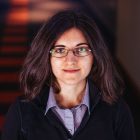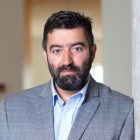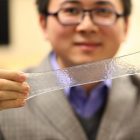Mohammad Alizadeh is a Principal Engineer at Cisco, which he joined through the acquisition of Insieme Networks in 2013. He received his PhD in Electrical Engineering from Stanford University in 2013, where he was advised by Balaji Prabhakar. Before that, he completed his undergraduate degree in Electrical Engineering at Sharif University of Technology. He will join the faculty as an assistant professor in September 2015. His research interests are broadly in the areas of networked systems, datacenter networking, and cloud computing. His dissertation work focused on designing high performance packet transport mechanisms for datacenters. His research has garnered significant industry interest: the Data Center TCP (DCTCP) congestion control algorithm has been integrated into the Windows Server 2012 operating system; the QCN algorithm has been standardized as the IEEE 802.1Qau standard; and most recently, the CONGA adaptive load balancing mechanism has been implemented in Cisco’s new flagship Application Centric Infrastructure products. Mohammad is a recipient of a SIGCOMM best paper award, a Stanford Electrical Engineering Departmental Fellowship, the Caroline and Fabian Pease Stanford Graduate Fellowship, and the Numerical Technologies Inc. Prize and Fellowship.

Mohammad Alizadeh
Electrical Engineering and Computer Science https://engineering.mit.edu/faculty/mohammad-alizadeh/Tamara Broderick is a PhD candidate in statistics at the University of California, Berkeley and will start as an assistant professor in EECS at MIT in January 2015. She received an AB in Mathematics from Princeton University (2007), a Master of Advanced Study for completion of Part III of the Mathematical Tripos from the University of Cambridge (2008), an MPhil in Physics from the University of Cambridge (2009), and an MS in Computer Science from the University of California, Berkeley (2011). Her recent research has focused on developing and analyzing models for scalable, unsupervised learning using Bayesian nonparametrics. She has been awarded the Evelyn Fix Memorial Medal and Citation (for the PhD student on the Berkeley campus showing the greatest promise in statistical research), the Berkeley Fellowship, an NSF Graduate Research Fellowship, a Marshall Scholarship, and the Phi Beta Kappa Prize (for the graduating Princeton senior with the highest academic average).
https://engineering.mit.edu/wp-content/uploads/2016/12/headshot_broderick-330x330.jpg
Website
Tamara Broderick
Electrical Engineering and Computer Science https://engineering.mit.edu/faculty/tamara-broderick/Michael Carbin will be joining MIT as an assistant professor in January of 2016. His research interests include the theory, design, and implementation of programming systems, including languages, program logics, static and dynamic program analyses, runtime systems, and mechanized verifiers. His recent research has focused on the design and implementation of programming systems that deliver improved performance and resilience by incorporating approximate computing and self-healing. His research on verifying the reliability of programs that execute on unreliable hardware received a best paper award at a leading programming languages conference (OOPSLA 2013). His undergraduate research at Stanford University received the Wegbreit Prize for Best Computer Science Undergraduate Honors Thesis. As a graduate student at MIT, he received the MIT Lemelson Presidential and Microsoft Research Graduate Fellowships.

Michael Carbin
Electrical Engineering and Computer Science https://engineering.mit.edu/faculty/michael-carbin/James Collins will join the faculty in December as a professor in BE and a core member of IMES. He received a PhD in Mechanical Engineering from Oxford. Jim is currently the William F. Warren Distinguished Professor, University Professor, Professor of Biomedical Engineering and Director of the Center of Synthetic Biology at Boston University. He is a world leader in bringing together engineering principles and fundamental biology to make new discoveries and invent systems that can improve the human condition. Jim is among the founders of the field of Synthetic Biology.
https://engineering.mit.edu/wp-content/uploads/2016/12/headshot_collins-330x330.jpg
Website
James Collins
Biological Engineering #Otto Cordero will join the faculty in July 2015 as an assistant professor. He received a B.S. in Computer and Electrical Engineering from the Polytechnic University of Ecuador, an MSc in Artificial Intelligence from Utrecht University, and a PhD in Theoretical Biology also from Utrecht University. For his PhD dissertation Otto worked with Professor Paulien Hogeweg on the scaling laws that govern the evolution of genome size in microbes. Otto was an NWO (Dutch Scientific Council) Postdoctoral Fellow working with Martin Polz on the evolutionary ecology of marine bacteria. During this period Otto pursued a study of ecological and social interactions in wild populations of bacteria, and demonstrated the importance of these interactions in generating patterns of diversity and sustaining ecological function. In 2013 Otto was awarded the European Research Council Starting Grant (the most prestigious career award in Europe) to reconstruct and model networks of ecological interactions that form between heterotrophic microbes in the ocean. Since November 2013 Otto has been Assistant Professor at the ETH Zurich. The main goal of Otto’s lab is to develop the study of natural microbial communities as dynamical systems, using a combination of experimental and computational approaches.
https://engineering.mit.edu/wp-content/uploads/2016/12/headshot_cordero-330x330.jpg
Website
Otto Cordero
Civil and Environmental Engineering #Areg Danagoulian joined the faculty as an assistant professor in July 2014. He received the SB degree in Physics from MIT and a PhD in Experimental Nuclear Physics from UIUC. He was a post-doctoral associate at Los Alamos and subsequently worked as a senior scientist at Passport Systems, Inc. Areg’s research interests are focused in the field of nuclear security. He works on problems in the areas of nuclear nonproliferation, technologies for arms control treaty verification, nuclear safeguards, and nuclear cargo security. Specific projects include the development of zero knowledge detection concepts for weapon authentication and research on monochromatic, tunable sources that can be applied to active interrogation of cargoes. Other areas of research include nuclear forensics and the development of new detection concepts. Areg’s research and teaching will contribute to NSE’s growing program in nuclear security.
https://engineering.mit.edu/wp-content/uploads/2017/01/danagoulian.jpg
Website
Areg Danagoulian
Nuclear Science and Engineering https://engineering.mit.edu/faculty/areg-danagoulian/Ruonan Han joined the faculty in September as an assistant professor. He is also a core member of the Microsystems Technology Laboratories (MTL). He received his PhD degree in Electrical and Computer Engineering from Cornell University in 2014. Prior to that, he received his B.Sc. degree from Fudan University in 2007, and M.Sc. degree in Electrical Engineering from the University of Florida in 2009. His research group aims to explore microelectronic circuit and system technologies to bridge the terahertz gap between microwave and infrared domains. They focus on the challenging topics such as high-power generation, sensitive detection and energy-efficient systems. Ruonan is the recipient of the ECE Director’s Best Thesis Research Award and Innovation Award from Cornell University, the Solid-State Circuits Society (SSCS) Pre-Doctoral Achievement Award and Microwave Theory Techniques Society (MTT-S) Graduate Fellowship Award from IEEE, as well as the Best Student Paper Award from IEEE Radio-Frequency Integrated Circuits Symposium (RFIC).

Ruonan Han
Electrical Engineering and Computer Science https://engineering.mit.edu/faculty/ruonan-han/Juejun (JJ) Hu will join the faculty in January 2015 as an assistant professor and as the Merton C. Flemings Career Development Professorship of Materials Science and Engineering. He comes to us from the University of Delaware, where he was a tenure-track assistant professor. Prior to that, he was a post-doc in MIT’s Microphotonics Center. As the Francis Alison Young Professor, Juejun initiated and led research projects involving environmental monitoring, renewable energy, biological sensing, and optical communications. He received the 2013 Gerard J. Mangone Young Scholars Award, which recognizes promising and accomplished young faculty and is the University of Delaware’s highest faculty honor. His research is in three main thrust areas: substrate-blind multifunctional photonic integration; mid-infrared integrated photonics; and 3-D photonic integrated circuits. Juejun’sgroup has applied these photonic technologies to address emerging application needs in environmental monitoring, renewable energy harvesting, communications, and biotechnology. He holds the B.S. in Materials Science and Engineering from Tsinghua University, and the Ph.D from MIT DMSE.

Juejun (JJ) Hu
Materials Science and Engineering https://engineering.mit.edu/faculty/juejun-jj-hu/Rafael Jaramillo will join the faculty as and assistant professor and the Toyota Career Development Professorship in Materials Science and Engineering, beginning summer 2015. He has a B.S. summa cum laude and an M.Eng., both in Applied and Engineering Physics from Cornell University. He also holds a PhD in Physics from the University of Chicago. Rafael is currently a senior postdoctoral fellow at MIT in the Laboratory of Manufacturing and Productivity (LMP). His interests in renewable energy and accomplishments in developing materials systems and techniques for energy applications led to him receiving the Energy Efficiency and Renewable Energy Postdoctoral Research Fellowship from the US Department of Energy. Prior to his appointment in LMP, Rafael was a postdoctoral fellow at the Harvard University Center for the Environment. His research interests lie at the intersection of solid state physics, materials science, and renewable energy technologies.

Rafael Jaramillo
Materials Science and Engineering https://engineering.mit.edu/faculty/rafael-jaramillo/Stefanie Jegelka will join the faculty in January 2015. She is currently a postdoctoral researcher in the Department of Electrical Engineering and Computer Science at UC Berkeley. She received a PhD in Computer Science from ETH Zurich (in collaboration with the Max Planck Institute for Intelligent Systems in Tuebingen, Germany), and a Diplom in Bioinformatics with distinction from the University of Tuebingen in Germany. During her studies, she was also a research assistant at the Max Planck Institute for Biological Cybernetics, and has spent a year at the University of Texas at Austin. She has spent research visits at Georgetown University, the University of Washington, the University of Tokyo, INRIA and Microsoft Research. She has been a fellow of the German National Academic Foundation and its College for Life Sciences, and has received a Google Anita Borg Fellowship, a Fellowship of the Klee Foundation, and a Best Paper Award at the International Conference on Machine Learning. Stefanie has organized several workshops on Discrete Optimization in Machine Learning, and has held three tutorials on Submodularity in Machine Learning at international conferences. Her research interests lie in algorithmic machine learning. In particular, she is interested in modeling and efficiently solving machine learning problems that involve discrete structure. She has also worked on distributed machine learning, kernel methods, clustering and applications in computer vision.

Stefanie Jegelka
Electrical Engineering and Computer Science https://engineering.mit.edu/faculty/stefanie-jegelka/Aleksander Madry is an assistant professor in the EPFL School of Computer and Communication Sciences and will start as an assistant professor at MIT in February 2015. His research centers on tackling fundamental algorithmic problems that are motivated by real-world optimization. Most of his work is concerned with developing new ideas and tools for algorithmic graph theory, with a particular focus on approaching central questions in that area with a mix of combinatorial and linear-algebraic techniques. He is also interested in understanding uncertainty in the context of optimization – how to model it, and how to cope with its presence. Aleksander received his PhD in Computer Science from MIT in 2011 and, prior to joining EPFL, spent a year as a postdoctoral researcher at Microsoft Research New England. His work was recognized with a variety of awards, including the ACM Doctoral Dissertation Award Honorable Mention, the George M. Sprowls Doctoral Dissertation Award, and a number of best paper awards at FOCS/SODA/STOC conferences.

Aleksander Madry
Electrical Engineering and Computer Science https://engineering.mit.edu/faculty/aleksander-madry/Xuanhe Zhao joined the MIT faculty in September 2014 as an assistant professor. Before joining MIT, he was an assistant professor in the Department of Mechanical Engineering and Materials Science at Duke University. He earned his PhD at Harvard University in 2009. Xuanhe conducts research on the interfaces between solid mechanics, soft materials and bioinspired design. His current research goal is to understand and design new soft materials with unprecedented properties for impactful applications. His current research projects are centered on three bioinspired themes: artificial muscle (dielectric polymers & electromechanics), tough cartilage (tough and bioactive hydrogels & biomechanics), and transformative skin (functional surface instabilities & thin film mechanics). Xuanhe’s discovery of new failure mechanisms of dielectric polymers in 2011 and 2012 can potentially enhance electric energy densities of dielectric elastomers and gels over ten times. In 2012, he designed a new synthetic biocompatible hydrogel with hybrid crosslinking, which achieved fracture toughness multiple times higher than articular cartilage — unprecedented by previous synthetic gels. With fiber reinforcements, Xuanhe further controlled the modulus of the tough hydrogel over a wide range from a few kPa to over 10 MPa in 2013 and 2014. By harnessing surface instabilities such as wrinkles and creases in 2014, he dynamically varied both surface textures and colors of an electro-mechano-chemically responsive elastomers to achieve the dynamic-camouflage function of cephalopods. This work was highlighted as Nature News, reported by the Washington Post, and featured on the front page of MIT webpage: “How to hide like an octopus”. Xuanhe is a recipient of the NSF CAREER Award, ONR YIP Award, and the Early Career Researchers Award from AVS Biomaterial Interfaces Division.
https://engineering.mit.edu/wp-content/uploads/2017/01/zhao.jpg
Website